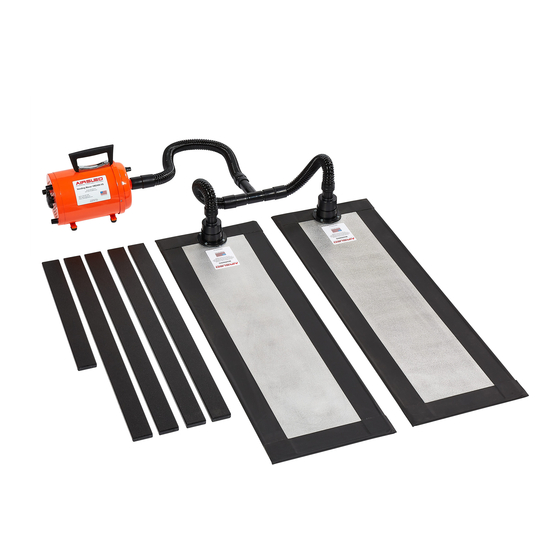AIRSLED VM2400 Kullanıcı El Kitabı - Sayfa 4
Otomatlar AIRSLED VM2400 için çevrimiçi göz atın veya pdf Kullanıcı El Kitabı indirin. AIRSLED VM2400 9 sayfaları. Vending mover
Ayrıca AIRSLED VM2400 için: Kullanıcı El Kitabı (9 sayfalar)

OPERATING YOUR AIRSLED
•
Once the air beams are in position and all connections are
snug, you are ready to plug your system into a grounded
electrical outlet.
•
Strap the blower comfortably over your shoulder and
engage the power switch.
•
BE PREPARED to brace and control the load once your
Airsled system is activated. Using both hands to control and
maneuver the load at all times is recommended. See figure
5.
CONTROL AND MANEUVERABILITY
•
All Airsled systems have an air flow controller. See figure 6. By fully
opening the controller, less air will flow into the air beams. This can help
reduce the lift especially in situations where overhead clearance is
limited (e.g., less than 2").
•
When overhead clearance is less than 2", the load may get "wedged"
in place once it is lifted by the air beams. Overhead with less than 2"
clearance may also get damaged when the load is lifted. If
fully opening the air flow controller does not resolve this
issue, you can rapidly toggle the power switch between the
ON/OFF positions. This will partially inflate the air beams
allowing you to slowly move the load.
toggle approach requires two operators and should be
done using extreme caution to avoid injury or damage.
•
Systems with DUAL SPEED performance (see figure 7a) have a
toggle switch with a HI and LO setting. At the HI setting, the
system's blower operates at full strength. At the LO setting, the
system's blower operates a half strength therefore reducing lift
capacity by 50%. If overhead clearance is less than 1", it is
recommended you start your system at the LO setting to ensure the
load does not get wedged in place.
•
Systems with dial-controlled, VARIABLE SPEED performance (see
figure 7a) can have the rate and height of air beam inflation
controlled making the load less likely to get wedged due to tight,
overhead clearance. If clearance is less than 1", it is recommended
you turn up the air flow gradually.
•
Tilting may occur if the load is not optimally positioned
over the air beams (e.g., object is up against a wall and air
beams only extend slightly through the rear). If the load
tilts away from you, you can use the Airsled foot brace by
laying it across the rear of the air beams and applying
downward pressure with your foot. See figure 7. If the load
tilts toward you, the air beams may be pushed under too
far and will need to be pulled back. If the load tilts to the
side, you may need to shift one or both of that air beams
to offset the tilt.
– this
WARNING
70 – A Aleph Dr.
Newark, DE 19702
Page 3 of 8
Figure 6
Figure 7a
Figure 7b
Figure 8
Support Email:
Toll Free Number: 1-800-AIRSLED (1-800-247-7533)
Figure 5
